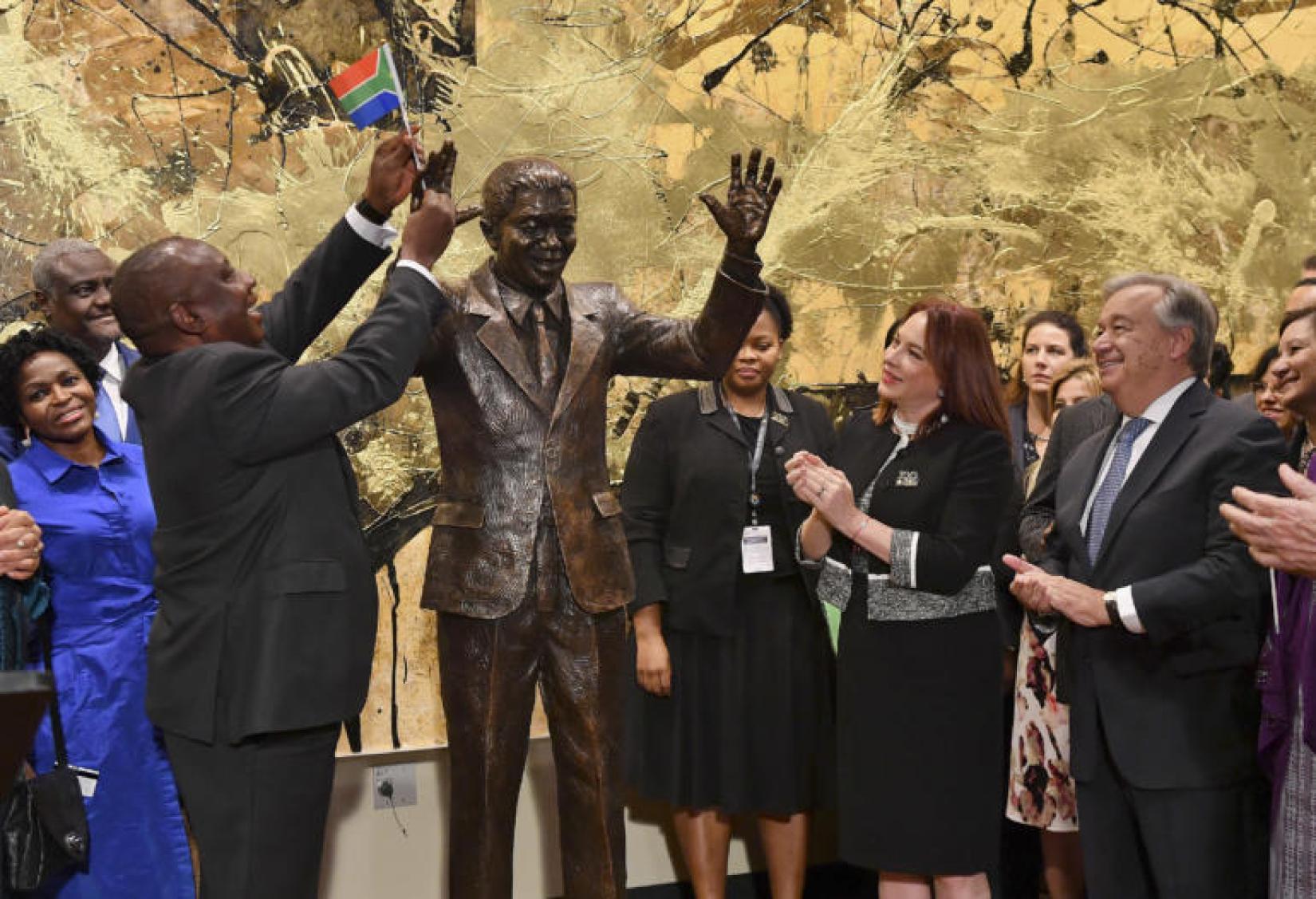The United Nations in South Africa
The UN: Partner in the Struggle against Apartheid
The elimination of South Africa’s system of legalized racial discrimination known as apartheid (“apart-ness” in the Afrikaans language of the descendants of the first Dutch settlers) was on the agenda of the United Nations from its inception. On 22 June 1946, the Indian government requested that the discriminatory treatment of Indians in the Union of South Africa be included on the agenda of the very first session of the General Assembly.
In the decades that followed the world body would contribute to the global struggle against apartheid by drawing world attention to the inhumanity of the system, legitimizing popular resistance, promoting anti-apartheid actions by governmental and non-governmental organizations, instituting an arms embargo, and supporting an oil embargo and boycotts of apartheid in many fields.
Key dates in the UN campaign against apartheid:
- 2 December 1950 — The General Assembly declared that “a policy of ‘racial segregation’ (apartheid) is necessarily based on doctrines of racial discrimination”. (Resolution 395(V))
- 1 April 1960 — The Security Council, in its first action on South Africa, adopted Resolution 134 deploring the policies and actions of the South African government in the wake of the killing of 69 peaceful African protesters in Sharpeville by the police on 21 March. The Council called upon the government to abandon its policies of apartheid and racial discrimination.
- 2 April 1963 — First meeting of the Special Committee on the Policies of Apartheid of the Government of the Republic of South Africa, It was later renamed the “Special Committee against Apartheid”.
- 7 August 1963 — The Security Council adopted Resolution 181 calling upon all States to cease the sale and shipment of arms, ammunition, and military vehicles to South Africa. The arms embargo was made mandatory on 4 November 1977.
- 13 November 1963 — The General Assembly, in Resolution 1899 (XVIII) on the question of Namibia, urged all States to refrain from supplying petroleum to South Africa. It was the first of many efforts by the UN to enact effective oil sanctions against apartheid.
- 23 August-4 September 1966 — International Seminar on Apartheid, Brasilia, organised by the UN Division of Human Rights, the Special Committee against Apartheid and the government of Brazil – the first of scores of conferences and seminars on apartheid organised or co-sponsored by the United Nations.
- 2 December 1968 — The General Assembly requested all States and organisations “to suspend cultural, educational, sporting and other exchanges with the racist regime and with organisations or institutions in South Africa which practice apartheid.
- 30 November 1973 — International Convention on the Suppression and Punishment of the Crime of Apartheid approved by the General Assembly (Resolution 3068(XXVIII)). The convention came into force on 18 July 1976.
- 1 January 1976 — The UN Centre Against Apartheid was established.
- 17 August 1984 — In Resolution 554 the Security Council declared null and void the new racist constitution of South Africa.
- 16-20 June 1986 — World Conference on Sanctions against Racist South Africa, organised by the United Nations in cooperation with the OAU and the Movement of Non-aligned Countries.
- 14 December 1989 — The General Assembly adopted by consensus the “Declaration on Apartheid and its Destructive Consequences in Southern Africa,” calling for negotiations to end apartheid and establish a non-racial democracy (Resolution A/RES/S-16/1).
- 22 June 1990 — Nelson Mandela addressed the Special Committee against Apartheid in New York — his first appearance before the Organisation.
- 30 July 1992 — With political violence escalating and negotiations at risk, Nelson Mandela requested the United Nations to send observers to South Africa. On the following day the Secretary-General announced that he would send a small group of UN monitors. The United Nations Observer Mission in South Africa was established by the Security Council on 17 August 1992.
- 8 October 1993 — The General Assembly requested States to restore economic relations with South Africa immediately, and terminate the oil embargo when the Transitional Executive Council in South Africa became operational (Resolution 48/1).
- 10 May 1994 — South Africa’s first democratically elected non-racial government took office following the general elections of 26-29 April.
- 23 June 1994 — The General Assembly approved the credentials of the South African delegation and removed the item of apartheid from its agenda. The Security Council removed the question of South Africa from its agenda on 27 June.


















